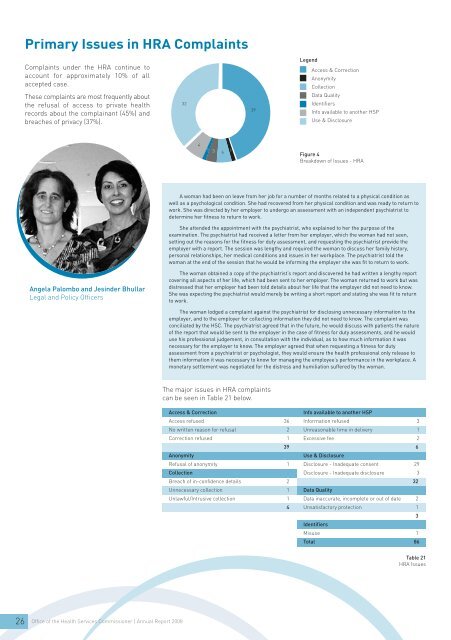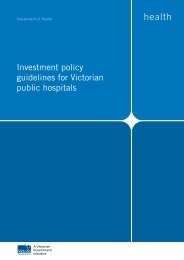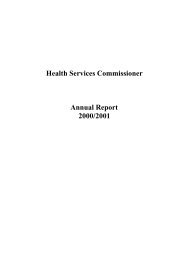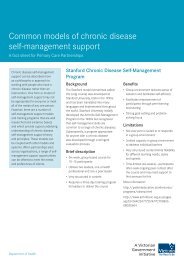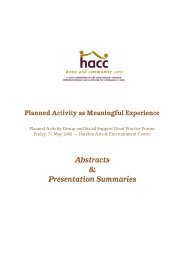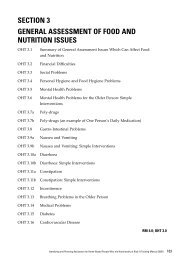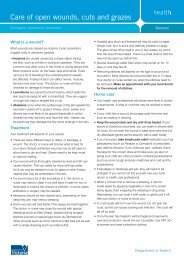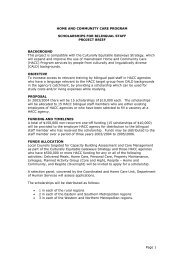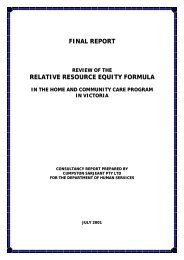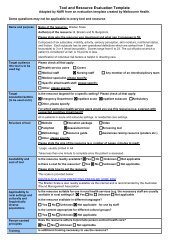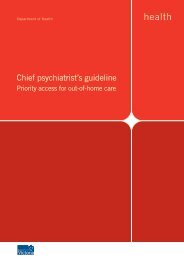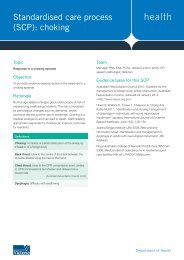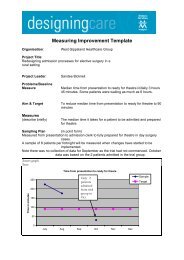Office of the Health Services Commissioner Annual Report 2008
Office of the Health Services Commissioner Annual Report 2008
Office of the Health Services Commissioner Annual Report 2008
You also want an ePaper? Increase the reach of your titles
YUMPU automatically turns print PDFs into web optimized ePapers that Google loves.
Primary Issues in HRA Complaints<br />
Complaints under <strong>the</strong> HRA continue to<br />
account for approximately 10% <strong>of</strong> all<br />
accepted case.<br />
These complaints are most frequently about<br />
<strong>the</strong> refusal <strong>of</strong> access to private health<br />
records about <strong>the</strong> complainant (45%) and<br />
breaches <strong>of</strong> privacy (37%).<br />
32<br />
39<br />
Legend<br />
Access & Correction<br />
Anonymity<br />
Collection<br />
Data Quality<br />
Identifiers<br />
Info available to ano<strong>the</strong>r HSP<br />
Use & Disclosure<br />
4<br />
1 3<br />
6<br />
1<br />
Figure 4<br />
Breakdown <strong>of</strong> Issues - HRA<br />
A woman had been on leave from her job for a number <strong>of</strong> months related to a physical condition as<br />
well as a psychological condition. She had recovered from her physical condition and was ready to return to<br />
work. She was directed by her employer to undergo an assessment with an independent psychiatrist to<br />
determine her fitness to return to work.<br />
She attended <strong>the</strong> appointment with <strong>the</strong> psychiatrist, who explained to her <strong>the</strong> purpose <strong>of</strong> <strong>the</strong><br />
examination. The psychiatrist had received a letter from her employer, which <strong>the</strong> woman had not seen,<br />
setting out <strong>the</strong> reasons for <strong>the</strong> fitness for duty assessment, and requesting <strong>the</strong> psychiatrist provide <strong>the</strong><br />
employer with a report. The session was lengthy and required <strong>the</strong> woman to discuss her family history,<br />
personal relationships, her medical conditions and issues in her workplace. The psychiatrist told <strong>the</strong><br />
woman at <strong>the</strong> end <strong>of</strong> <strong>the</strong> session that he would be informing <strong>the</strong> employer she was fit to return to work.<br />
Angela Palombo and Jesinder Bhullar<br />
Legal and Policy <strong>Office</strong>rs<br />
The woman obtained a copy <strong>of</strong> <strong>the</strong> psychiatrist’s report and discovered he had written a lengthy report<br />
covering all aspects <strong>of</strong> her life, which had been sent to her employer. The woman returned to work but was<br />
distressed that her employer had been told details about her life that <strong>the</strong> employer did not need to know.<br />
She was expecting <strong>the</strong> psychiatrist would merely be writing a short report and stating she was fit to return<br />
to work.<br />
The woman lodged a complaint against <strong>the</strong> psychiatrist for disclosing unnecessary information to <strong>the</strong><br />
employer, and to <strong>the</strong> employer for collecting information <strong>the</strong>y did not need to know. The complaint was<br />
conciliated by <strong>the</strong> HSC. The psychiatrist agreed that in <strong>the</strong> future, he would discuss with patients <strong>the</strong> nature<br />
<strong>of</strong> <strong>the</strong> report that would be sent to <strong>the</strong> employer in <strong>the</strong> case <strong>of</strong> fitness for duty assessments, and he would<br />
use his pr<strong>of</strong>essional judgement, in consultation with <strong>the</strong> individual, as to how much information it was<br />
necessary for <strong>the</strong> employer to know. The employer agreed that when requesting a fitness for duty<br />
assessment from a psychiatrist or psychologist, <strong>the</strong>y would ensure <strong>the</strong> health pr<strong>of</strong>essional only release to<br />
<strong>the</strong>m information it was necessary to know for managing <strong>the</strong> employee’s performance in <strong>the</strong> workplace. A<br />
monetary settlement was negotiated for <strong>the</strong> distress and humiliation suffered by <strong>the</strong> woman.<br />
The major issues in HRA complaints<br />
can be seen in Table 21 below.<br />
Access & Correction<br />
Info available to ano<strong>the</strong>r HSP<br />
Access refused 36 Information refused 3<br />
No written reason for refusal 2 Unreasonable time in delivery 1<br />
Correction refused 1 Excessive fee 2<br />
39 6<br />
Anonymity<br />
Use & Disclosure<br />
Refusal <strong>of</strong> anonymity 1 Disclosure - Inadequate consent 29<br />
Collection Disclosure - Inadequate disclosure 3<br />
Breach <strong>of</strong> in-confidence details 2 32<br />
Unnecessary collection 1 Data Quality<br />
Unlawful/Intrusive collection 1 Data inaccurate, incomplete or out <strong>of</strong> date 2<br />
4 Unsatisfactory protection 1<br />
3<br />
Identifiers<br />
Misuse 1<br />
Total 86<br />
Table 21<br />
HRA Issues<br />
26<br />
<strong>Office</strong> <strong>of</strong> <strong>the</strong> <strong>Health</strong> <strong>Services</strong> <strong>Commissioner</strong> | <strong>Annual</strong> <strong>Report</strong> <strong>2008</strong>


